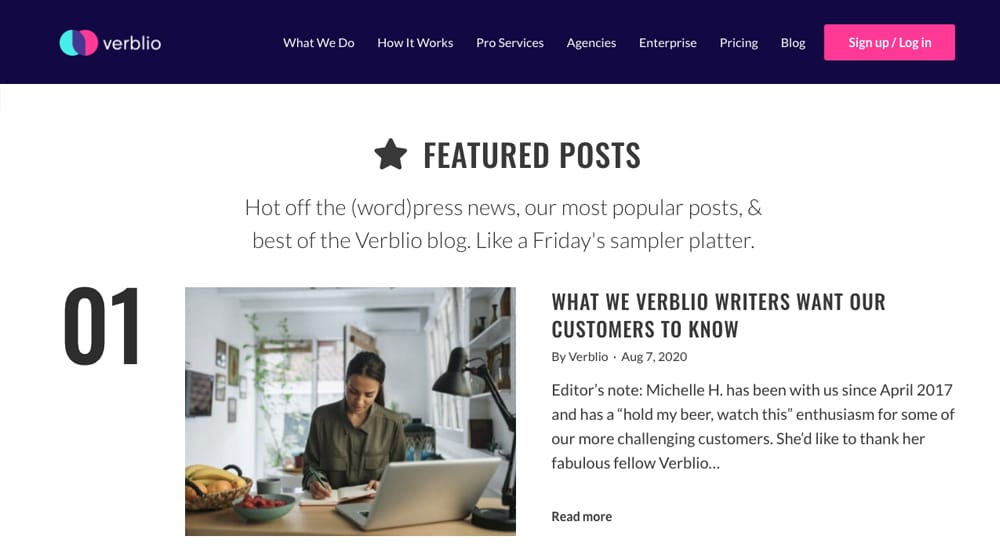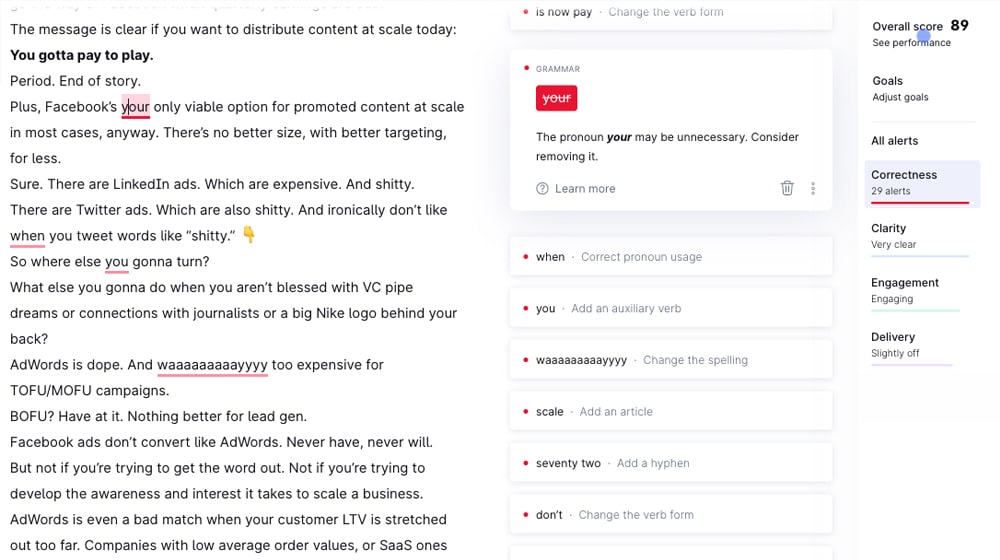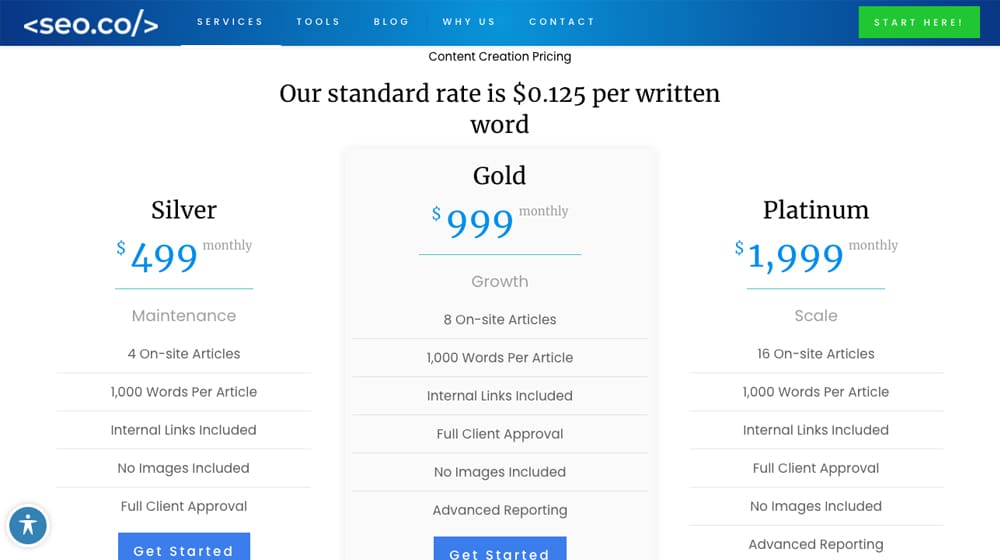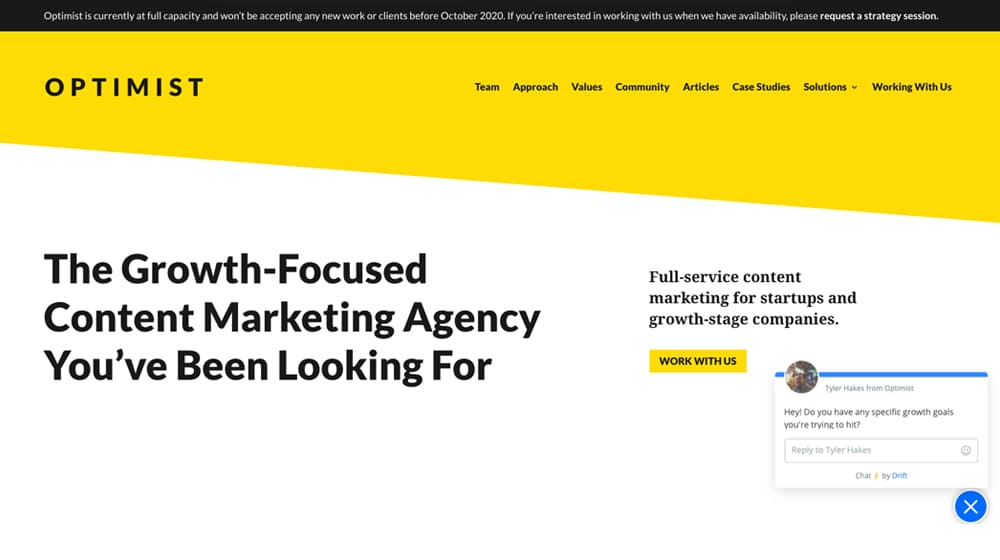5 Things to Check Before Hiring a Company to Write Your Blog Posts

There are hundreds of content marketing and blog management companies out there, all vying for your attention. If you want to outsource your blog to someone, you need to make sure they're going to do a good job. Part of this involves testing, of course; see what they do and make sure it's high enough quality.
Before you even get to that point – and that expense – you should do an overview and check into the company first. Here are five things you should check before hiring a blog management company.
 30 Second Summary
30 Second Summary
You should start by checking how often the company posts on their own blog - weekly posts are good, while less frequent posting is a red flag. You need to examine their content quality by looking at spelling, formatting, images and depth of information. Make sure the content they create for clients matches what they publish on their own site. You can research their reputation with Google searches and reviews. When you talk to them, you should ask tough questions about SEO, content strategy and topic selection to verify their expertise.
1. Check Their Blog Post Frequency
The first thing you should check – and it's easy to check – is how often the company posts to their company blog
It goes without saying, but they need to have a blog in the first place for you to check it. If they don't have a blog, you can scratch them off the list. What kind of blog management company doesn't have a blog of their own? It's a huge portfolio piece and a showcase of what they can do. Would you hire a dentist with no teeth?
Check their blog, and note the dates of the posts they publish. Look for two things.
The first thing you want to check for is their posting frequency. How often are they posting to their blog? Posting once a week is fine. Posting 3-5 times a week is great. Posting multiple times each day might be a bit excessive, but isn't necessarily a bad sign. Posting less than once a week is a bad sign; why aren't they posting more often? If they haven't posted to their blog all year, are they still in business?

Now and then you'll find a blogging company that posts once a month or less. Sometimes you'll even find one that hasn't posted in months. You have to wonder, why is that? Blogs are important to modern online commerce, but even more so, this is a company that is selling their ability to run a blog. You'd think they'd use their company blog to showcase what they can do.
More importantly, if they're selling a blog management service and their company blog is poorly managed, that's a warning sign.
The second thing to check is the consistency of their posting schedule. Do they post on the same days each week, at roughly the same time? Posting once a week but on random days each week indicates that they don't have a plan they're sticking with, which could also be a warning sign.
You might also consider correlating authors and posting frequency. Does the company have four authors posting on their blog, but one of them is doing 90% of the work? It could be a case of infrequent contributions, or guest posts, but it could also be a sign that former writers are no longer working for them, and they don't have new talent to replace them. It's also possible that they're putting a lot of work on one writer, and that writer runs the risk of burning out. You don't want to be their client if they can no longer handle the work.
2. Check Their Blog Quality
Once you've decided on a company based on their blogging frequency, take a deeper look at their blog posts themselves. I recommend picking four posts: the most recent two, one from a month or two ago, and one from a year or so ago. This gives you a reasonably decent sample of what their current quality is and what their past quality is. You can, of course, go through and read more if you like.

There are a lot of little indicators of quality you can look for throughout their posts.
- Spelling and grammar. Copy their post and run it through Grammarly or another checker. Are they frequently making mistakes? Does it look like an ESL writer wrote the content?
- Voice and tone. How casual or formal is their writing? Are they conversational? Does the writing style work well for the web? Does it match their branding?
- Word count. Are they publishing 750-word posts, 2,000-word posts, or something in between? Are all of their posts roughly the same length?
- Formatting. Do they make use of bold, underline, and italics? Do they do strange things with quotes or background colors or highlights? Does it look professional?
- Structure. Use of bullets and subheadings. These are important for breaking up text walls in modern web writing, so if they don't use them, you have to wonder why not.
- Readability. Use of shorter and single-sentence paragraphs. Using single-sentence paragraphs for emphasis is a great technique, but even just making sure paragraphs are shorter is important for web writing.
- Images. More specifically, the presence and frequency of images. If they don't have any images, it's a bad sign. If they have one or two in a post, eh, not great but not the worst. If they have four or five, that's much better.
- Type of images. Are their images photographs, graphic design, a mixture? Do they look like stock photos, or are they original? If you use a reverse image search, do they show up elsewhere?
- Use of multimedia. The web is increasingly multimedia-heavy. Do they embed YouTube videos or social media posts? Do they take advantage of other forms of multimedia? It's not 100% necessary, but it's a good sign that they care to go the extra mile.
- Internal links. How many internal links do they put in their posts, and are they contextual or CTAs?
- External links. What sites other than their own are they linking to? Are they authoritative, or does it look more like they're linking to clients?
- Useful and deep information. Reading the post, do you feel like you learned something, or is it all superficial? Was there actionable advice, or was it all stuff you already knew? Did it serve its purpose?
- Duplication from other sources. Was the content original? Copy some of it and run it through a Google search or a tool like Copyscape.
Consider this a checklist of attributes to go through to vet the quality of the content they're producing for their company blog, then continue.
3. Check Their Content Versus Client Content
One thing you have to be wary of when shopping for a content marketer or blog manager is the bait and switch. I've seen it quite a bit; a company will have an excellent blog and portfolio on their site, but when you sign up with them, the content they provide you is a bottom of the barrel content mill article that sounds funny and rambles on without addressing the topic of the article or helping the reader.
One of the biggest signals of this is content length. I've seen companies write 2,000-word blog posts for their company blog, and then sell 500-word posts for their clients. They rely on a strict no-refund policy, inattentive clients, or just ghosting people to make their money.

This often happens when the company you're looking at is actually buying their content through a content mill in the background.
If you want to be extra clever, you can sign up for sites like Textbroker, Verblio, and Writer Access as a writer, and look for assignments being posted that match what you order from a company. I don't know that I'd recommend this technique – it's not really necessary – but it's funny to catch them in the act when they do it.
The one unfortunate part about this check is that you often can't get a glimpse of the content the company would be providing you until you sign a deal and pay for a trial or a first month. Many such companies are wary about providing content without getting paid.
That said, you may be able to talk to their other clients and look at those blogs to see what's going on. If they're willing to give you a client list so you can research, go through the same blogging checklist as mentioned above.
4. Check Their Reputation
Not every blog management company is going to be an industry-dominating thought leader, but you want to at least see what information is out there.
Do a Google search for the company's name. Where do they show up? You'll have to weed out all of the algorithmic sites that are nothing but databases and scraped info, of course. Look for sites that have reviewed them or mentioned them in link articles. What sort of overviews and descriptions do they have?
We create blog content that converts - not just for ourselves, but for our clients, too.
We pick blog topics like hedge funds pick stocks. Then, we create articles that are 10x better to earn the top spot.
Content marketing has two ingredients - content and marketing. We've earned our black belts in both.

It says a lot if a company is mentioned as a good option on a site like Forbes or Entrepreneur. It's also great if influencers like Neil Patel or Harsh Agrawal mention them. It can be fine if they're mentioned by a bunch of mid-level bloggers and marketing blogs, but that indicates they're in the "competent service" level, not the "thought leader" level. If they're hard to find, it makes you wonder.
Do a Google search for their CEO's name, their primary author's name, and any other relevant names that come up as part of the company. What kind of results do you get? Do these people write for other sites? Do they contribute to high-end publications? Do they show up as a contributor for dozens of blogs? Consider the plausibility of their reach. If they don't show up anywhere else, that could be a bad sign.
Obviously, if they have a lot of bad reviews, that's another warning sign. You do have to take reviews with a grain of salt, though. Good reviews can be astroturfed, and bad reviews might be left by a competitor. There's also always going to be someone writing a bad review based on their own mistakes when the company did nothing wrong. Use your best judgment.
5. Ask Them Tough Questions
If the company you're investigating has passed the first four checks, you'll be reaching a point where you can reach out and talk to a company rep.
First, consider who they have you talking to. Are you given a direct line to their CEO? Do you talk to their head of accounts? Are you assigned a random mid-level or lower company rep? How much attention are they giving you? That can indicate how they're going to treat you as a client.
Once you've gotten the pleasantries out of the way, start asking questions. Tough questions.
"How did Google Panda and Penguin change the way you produce blog posts?"
Panda made short, thin content no longer viable, and penguin paid a lot of attention to link quality. Of course, it's entirely possible that a company is newer than those algorithms, so they might not have answers because they weren't around when those updates happened.
"What are the most important factors Google looks for when they evaluate a post?"
Answers may vary here but they should follow certain trends. Google cares about quality, relevance, and usability. They also care more about how the user sees and gets value from a post than anything else. At their core, good blog posts should be useful to the reader.
"How do you cater to E-A-T scores?"
EAT is Expertise, Authority, and Trustworthiness. Blogs want to build up all three of those with their content. Note that you can replace this with whatever Google's metric of focus is for the current year since they release new algorithm updates from time to time. The point is mostly to make sure that the company is paying attention to recent Google changes and focuses. If they ask you what "E-A-T" is, they might be using content standards that are old and outdated.
"How do you come up with blog post topics?"
They might not want to give you a full process for topic ideation, but they should at least be able to tell you what tools they use and what processes help them come up with topics. If they just "come up with the ideas", you should reconsider; they might not be putting real thought into it.
"Why do you choose the topics you do?"
Good bloggers come up with dozens of topics before picking one to write, and they often leave ideas on the cutting room floor. What makes the ideas they keep make the cut? Look for answers about competition, relevance, and authority.
I say tough questions, but they aren't really difficult questions to answer… if you know what you're talking about. A company made up of writers who don't do blog management might produce great content but have no direction or strategy for marketing. A company that doesn't care about SEO won't have great answers for writing content that is search-friendly.
Once you've gone through all of these phases, you'll either have found a deal-breaker, or you'll have found a company worth trying out.
If you think the company is worth giving a try, sign up for a trial run. Most blog management companies will offer a month-long trial, or even just a single pilot article to showcase what they can do. Evaluate this post the same way you evaluated theirs, and hopefully, you'll have found a winning company.
Have you used any blog management companies in the past? Will you use any of these tips in the future when searching for a new agency? Let us know in the comment section down below!



 30 Second Summary
30 Second Summary


October 19, 2020
Everyone who decided to hire a company should read this to prevent what I encountered. I hired a company to help me with blog management, but I ended up receivin very poorly written content that is on-par or worse than what I was getting at content mills. They might even be buying from content mills directly. Unfortunately, I signed a minimum 6 months contract with them and it's only been a month since I signed up so it's really a pain. Can you suggest something that I can do to get rid of them ASAP?
October 19, 2020
Hi Brian! I'd give them a call and see if you can work something out. Communication is really important when you work with any type of creative industry such as content writing, and they may be able to void this contract if you're unhappy with their work. You may also want to consider speaking with an attorney if communication channels are no longer open or if your talks start to get unfriendly. I'm sorry that's happening, I'm not a big fan of contracts myself, especially on something as tricky and personalized as content, but hopefully they are acting in good faith and can help you cancel this out.
October 10, 2024
Did they mention any quality promises?
October 15, 2024
Hey Jeromy!
That's a great question! Quality guarantees are a clear sign that a company really stands by the work they do. In my own experience services like Shopify or HubSpot really have effective tools and solid quality standards.
I hope this helps! Please let me know if you need any more details. 😊
December 22, 2020
Hi James! Very interesting tips, I've been in the marketing industry for a long time but I've never looked at it this way. If somebody who writes blog posts for a living doesn't have a blog, that's a pretty big warning sign.
December 27, 2020
Hey Tom! Thanks for the kind words.
I agree. It's fortunate that blogging is a digital industry, so it's easy to check their website and see what they're doing for themselves.
With many other industries, this isn't possible, but on the internet, these things are public.
I think it's weird too when companies swear by their ability to grow websites with blogging but they aren't doing it for their own website.
I've seen some companies say it's because they're too busy with their clients or they don't have time, but that isn't exactly reassuring either for a prospective client.
I hope you found the other tips helpful as well. Good luck with your search!